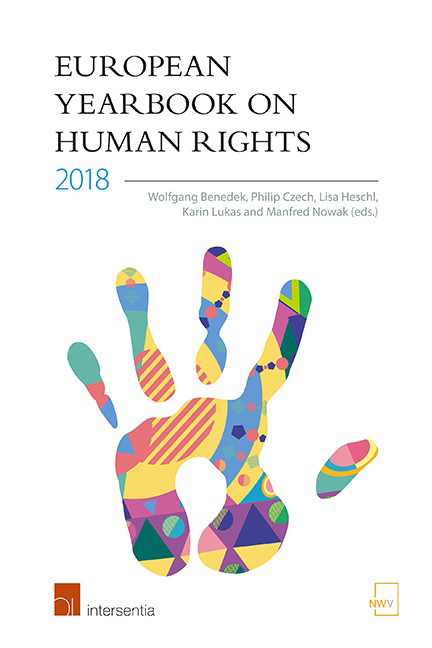Book contents
- Frontmatter
- Scientific Advisory Board
- Editors’ Preface
- Contents
- List of Abbreviations
- List of Contributors
- Part I Topic Of The Year
- Part II Eu
- Part III Coe
- PART IV OSCE
- Part V Others
- Part VI Book Reviews
- Katja S. Ziegler, Elizabeth Wicks and Loveday Hodson (eds.): The UK and European Human Rights – A Strained Relationship?
- Emily Reid: Balancing Human Rights, Environmental Protection and International Trade – Lessons from the EU Experience
- Nicole Bürli: Third-Party Interventions before the European Court of Human Rights
- Stijn Smet and Eva Brems (eds.): When Human Rights Clash at the European Court of Human Rights – Conflict or Harmony?
- Violeta Moreno-Lax: Accessing Asylum in Europe, Oxford Studies in European Law
- Mark Dawson: The Governance of EU Fundamental Rights
- Philip Leach: Taking a Case to the European Court of Human Rights, 4th Edition
- Sionaidh Douglas-Scott and Nicholas Hatzis (eds.): Research Handbook on EU Law and Human Rights
- Lauri Mälksoo and Wolfgang Benedek (eds.): Russia and the European Court of Human Rights – The Strasbourg Effect
- Index
Lauri Mälksoo and Wolfgang Benedek (eds.): Russia and the European Court of Human Rights – The Strasbourg Effect
from Part VI - Book Reviews
Published online by Cambridge University Press: 31 January 2019
- Frontmatter
- Scientific Advisory Board
- Editors’ Preface
- Contents
- List of Abbreviations
- List of Contributors
- Part I Topic Of The Year
- Part II Eu
- Part III Coe
- PART IV OSCE
- Part V Others
- Part VI Book Reviews
- Katja S. Ziegler, Elizabeth Wicks and Loveday Hodson (eds.): The UK and European Human Rights – A Strained Relationship?
- Emily Reid: Balancing Human Rights, Environmental Protection and International Trade – Lessons from the EU Experience
- Nicole Bürli: Third-Party Interventions before the European Court of Human Rights
- Stijn Smet and Eva Brems (eds.): When Human Rights Clash at the European Court of Human Rights – Conflict or Harmony?
- Violeta Moreno-Lax: Accessing Asylum in Europe, Oxford Studies in European Law
- Mark Dawson: The Governance of EU Fundamental Rights
- Philip Leach: Taking a Case to the European Court of Human Rights, 4th Edition
- Sionaidh Douglas-Scott and Nicholas Hatzis (eds.): Research Handbook on EU Law and Human Rights
- Lauri Mälksoo and Wolfgang Benedek (eds.): Russia and the European Court of Human Rights – The Strasbourg Effect
- Index
Summary
For this book, several renowned international experts join forces to address one of the most notorious topics of the contemporaneous European human rights landscape, which is the (strained) relationship between Russia and the European Court of Human Rights (ECtHR). To that outcome, the editors Lauri Mälksoo and Wolfgang Benedek bring together an international assembly of experts, willing to tackle the book ‘ s subject matter from a variety of different perspectives.
The diversity amongst these contributors is indeed noteworthy, given their different regional, academic and professional backgrounds. Russian authors contribute as well as Western scholars; articles of political scientists put the contributions of legal experts into perspective and the thoughts of scholars are joined by the voices of those who have seen actual legal practice – that is two former judges at the ECtHR.
But what exactly is the question this publication deals with? In the preface, the editors quite flatly state that the ‘ book deals with the question of what has been the impact of Russia ‘ s almost twenty years under the jurisdiction of the European Court of Human Rights ‘ (p. xiii). While that seems broad, the subtitle The Strasbourg Effect hints at the main thrust of the book ‘ s analytical focus: a play on the notion of the ‘ Helsinki effect ‘, the supposed positive effect that the Helsinki Final Act of 1975 had for the dissident movement in the then Union of Soviet Socialist Republics. However, as Lauri Mälksoo phrases it, the editors, when ‘ raising the question of the Strasbourg effect on Russia ‘, present the phrase ‘ Strasbourg effect ‘ with ‘ a certain question mark and not as a triumphant exclamation ‘ (p. 24). As a methodological approach, the ‘ socialization theory ‘ is tested for its relevance to the case of Russia.
To shed a light on Russia ‘ s relation with the ECtHR, the book is divided into four principal parts. The first part, which is fittingly called ‘ Setting the scene ‘ consists of two contributions outlining the publication ‘ s background.
- Type
- Chapter
- Information
- European Yearbook on Human Rights 2018 , pp. 621 - 622Publisher: IntersentiaPrint publication year: 2018



